Results for GCSEs are out on Thursday. We will, of course, be publishing analysis on the day. If you don’t want to miss it, why not sign up now to receive our blogposts as they come out?
As we gear up for results day, we’ve put together this post detailing things that we’ll be looking out for on the day.
1. Similar grading to last year… with a few exceptions
For the last few years, following the cancellation of public exams in 2020 and 2021, grading has been the biggest story on GCSE results day.
In 2020 and 2021, grades were much higher, on average, than pre-pandemic, and in 2022 they were adjusted back down to a mid-point between 2021 and 2019. Last year, they returned to pre-pandemic levels.
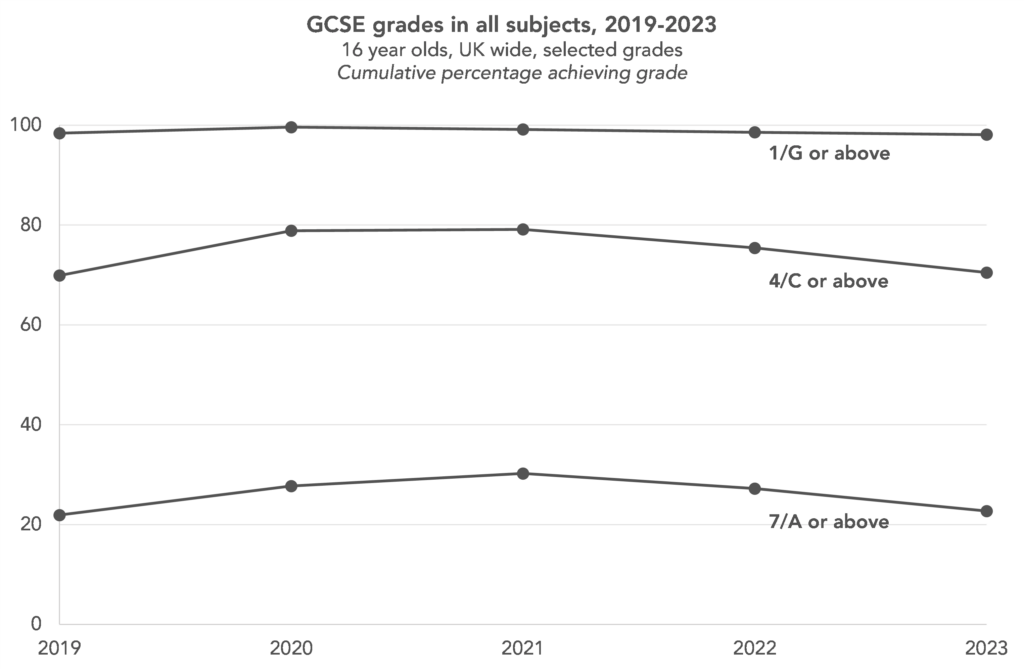
This year, for the first time since 2020, we do not expect any big changes in the grade distribution: broadly speaking, it will likely look the same as last year.
But there are a few exceptions.
Here at Datalab, we’ve been banging on about the harsh grading of modern foreign language GCSEs for years.
So we were pleased to hear that Ofqual plans to make some adjustments to grading this year. But we were slightly less pleased when we heard the details of the plan.
Essentially, the plan is to award some grades in French and German more generously this year, to bring grading in these subjects more closely in line with grading in Spanish. But we would argue that grading in Spanish is also overly harsh, and that these adjustments may still not go far enough.
The other exception is computer science, another harshly graded subject, in which Ofqual is also requiring grades at 9, 7 and 4 to be awarded more generously this year.
2. EBacc entries will likely remain stagnant
The proportion of pupils entered for the EBacc increased slightly last year. But only very slightly. And it’s remained at around 39-40% for nearly ten years now.
So why aren’t EBacc entries increasing? It’s the old story: relatively few pupils are studying languages at GCSE.
As a reminder, the EBacc, or English Baccalaureate, consists of entering for GCSEs in five subject areas, sometimes known as ‘pillars’: English, maths, science, languages, and humanities (either history or geography).
Virtually all pupils in mainstream schools enter GCSEs in English and maths, and the vast majority in science. Humanities entries are slightly less common, but were still entered by 82% of pupils last year, according to DfE figures. The sticking point is languages.
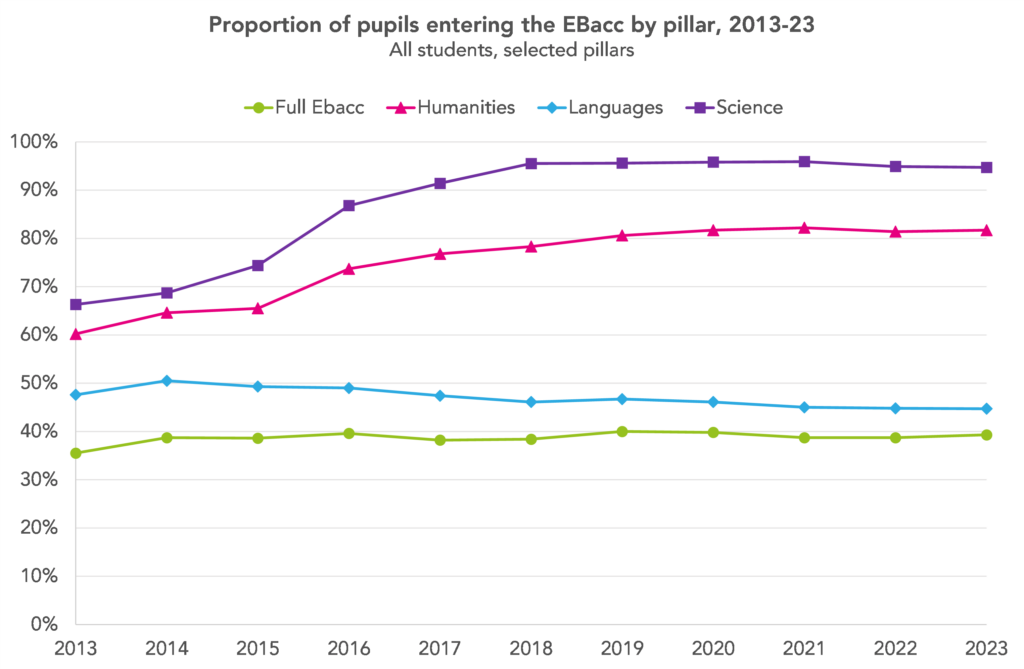
The proportion of pupils entered for a language has fallen every year since 2019. And we are likely to see another small fall this year.
Provisional data on entries suggests that, while entries to languages are likely to have increased this year, they will have increased by less than the increase in the overall population of 16 year olds.
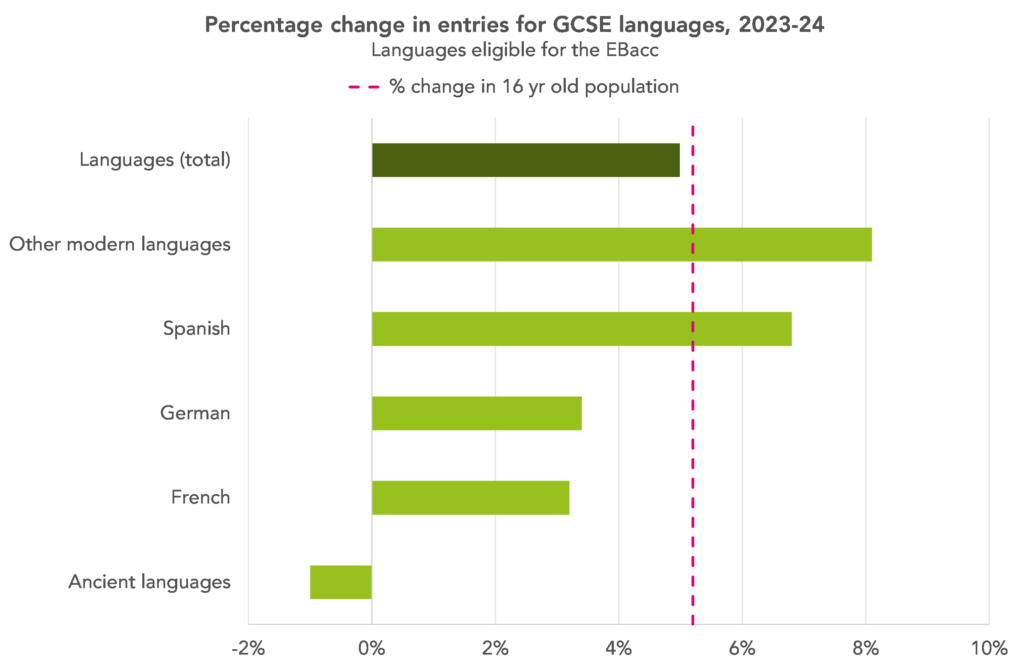
So, despite strong increases in entries in Spanish and other modern languages, we can probably expect to see the proportion of pupils entering languages fall again this year.
How far this is linked to the issue with grading that we mentioned earlier on is up for debate – the shortage of languages teachers is another big block. And according to DfE figures, recruitment of new teachers is not looking promising: just 33% of the target number of new modern languages teachers were recruited this year. Only a handful of subjects, including physics and music, were further away from their teacher recruitment target.[1]
And it may well be that, with a new government in place, we’ll see some changes to the EBacc. The inclusion of an arts pillar is one possibility, as part of Labour’s plans to increase access to the arts.
3. A boost in entries for statistics, engineering and classics
According to provisional entry figures, the subjects expecting the biggest boost in entry numbers this year are statistics, engineering and classical studies.
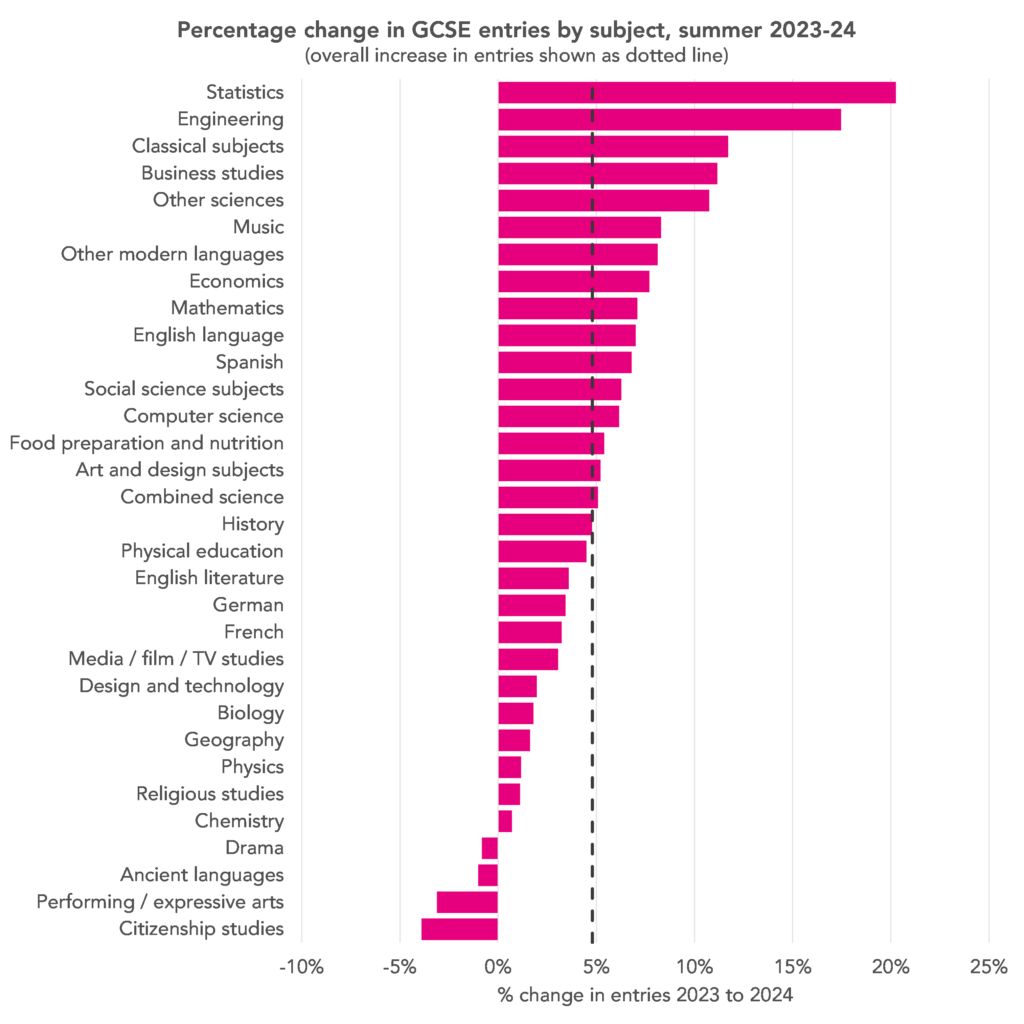
But despite the boost, actual entry numbers for these subjects remain low.
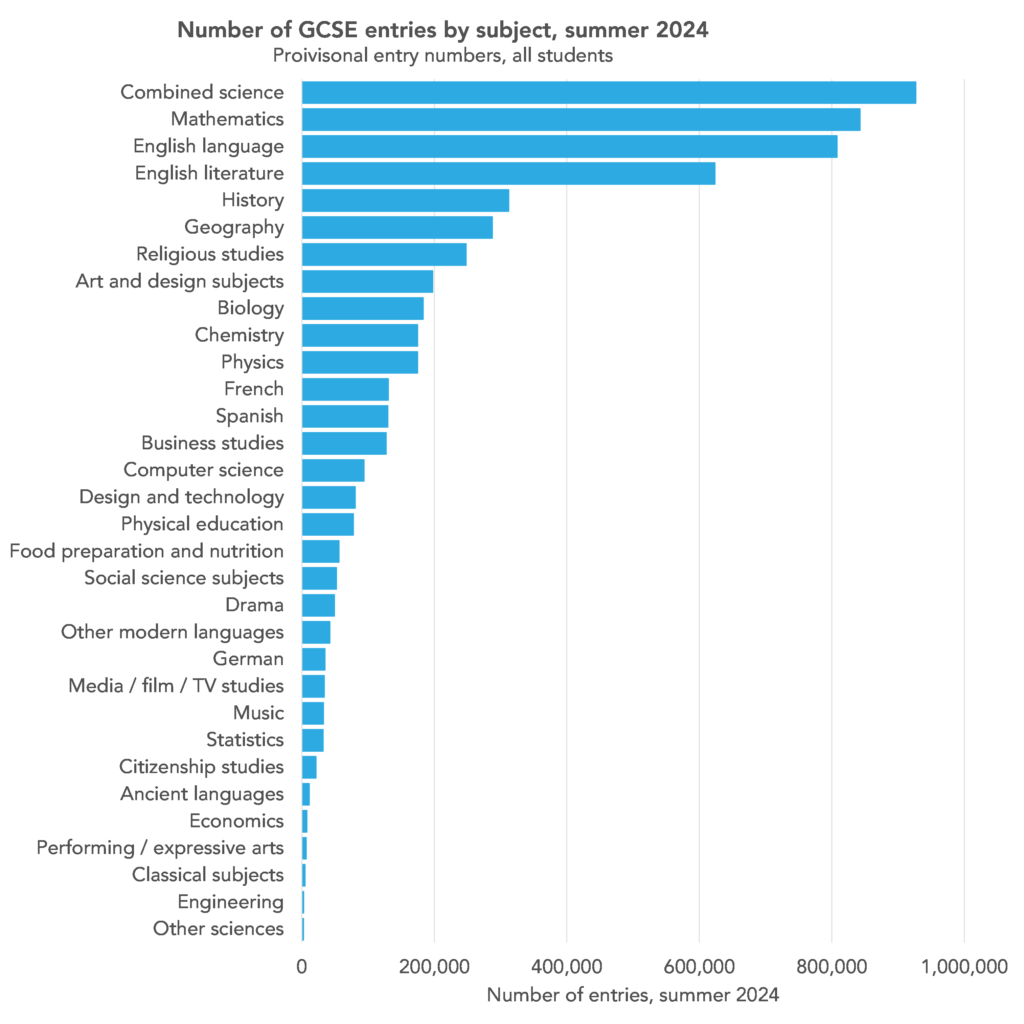
Subjects that are seeing both a consistent percentage increase and a high number of entries include business studies, computer science and Spanish.
4. Another increase in the number of resits
One unintended consequence of the cancellation of public exams in 2020 and 2021 was a fall in the number of GCSE resits in the following years.
As things stand, pupils who do not achieve a grade 4 or above in GCSE English or maths are required to resit the relevant qualification. With the boost in grades in 2020-22, a lower proportion of pupils were required to resit in the following years.
But this year, according to provisional figures from Ofqual, we expect an increase in resits, bringing us back close to pre-pandemic figures.
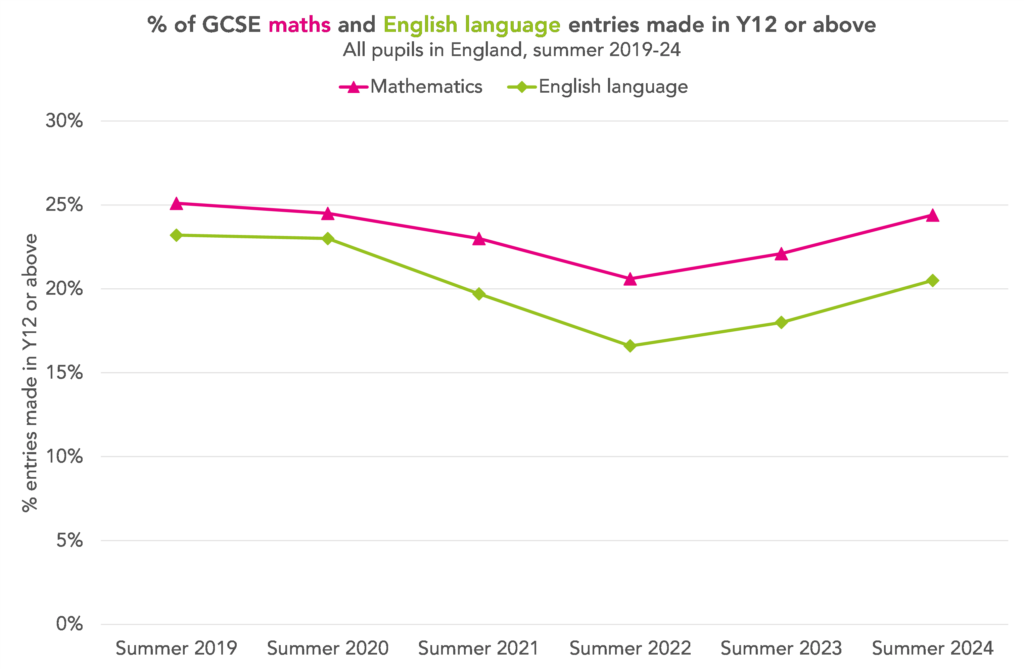
This year, we expect around a quarter of entries in maths to be from older pupils – largely those taking resits – and a around a fifth of entries in English language.
5. Differences between regions will remain… but we should remember that this isn’t the whole story
Last year, press coverage picked up on large regional gaps in GCSE grades.
According to figures from Ofqual, last year 28% of GCSE entries in London received a grade 7 or higher, compared to just 18% in the North East.
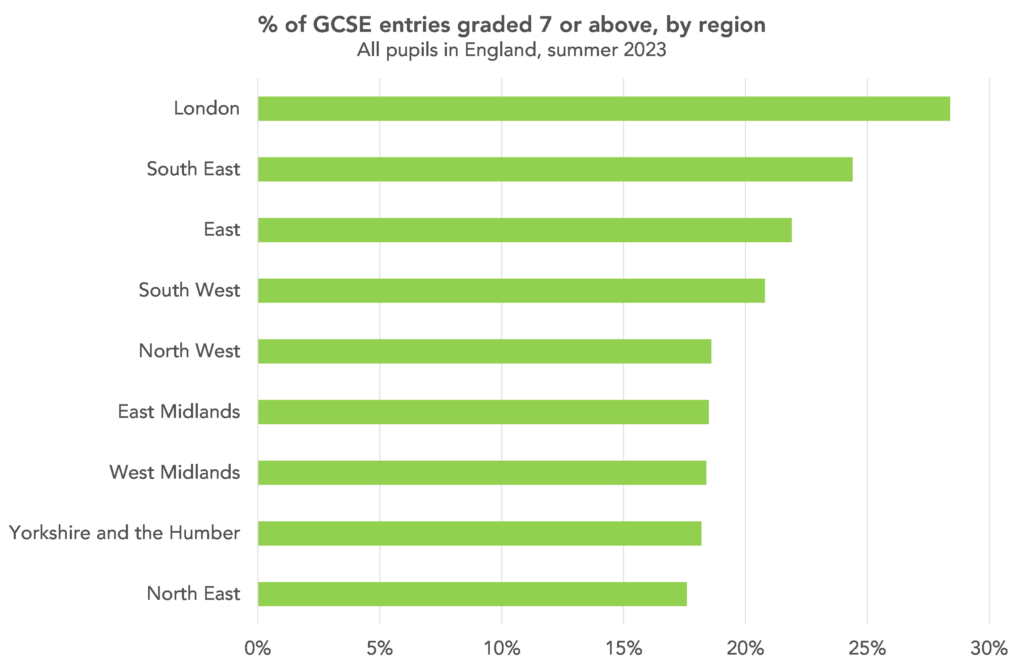
And this gap is nothing new, although it has been increasing: in 2019, the difference between London and the North East was 9.3 percentage points, and last year it was 10.8 percentage points.
This difference is not caused by grades in the North East and elsewhere going down, but rather by grades in London going up.
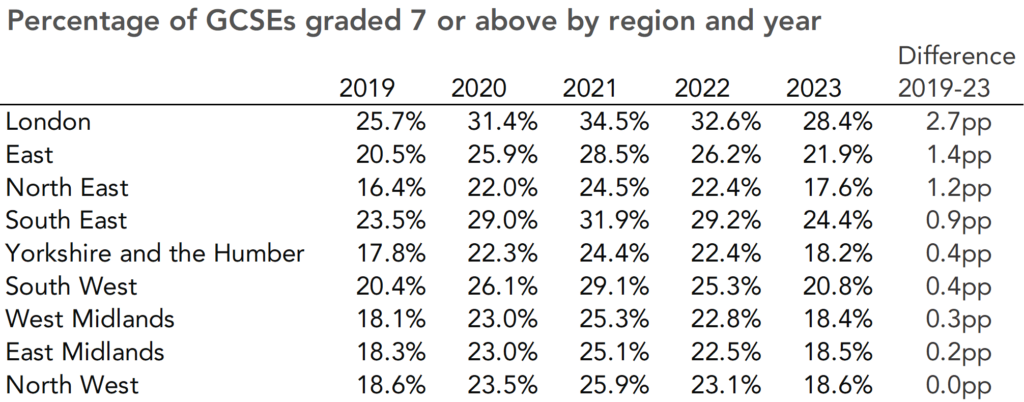
But, while these regional differences should certainly not be ignored, we would argue that they can be a distraction. Targeting support at regional level is unlikely to be specific enough: there is far more variation between schools at the local level than there is regionally.
We hope that the headlines on results day do not detract attention from the need to support low attaining pupils and underperforming schools, wherever they are, and to support access to effective schools for all.
Just one last thing…
Before we sign off, it’s worth flagging up that this is the last year that Progress 8 will be published until at least 2027. This is because the cohorts who will be completing Key Stage 4 in the next couple of years were due to take SATs during the pandemic, in 2020 and 2021; the cancellation of public exams left them without any official attainment measures for Key Stage 2.
So more weight than usual may be placed on this year’s Progress 8 scores, given that there won’t be updated scores for at least two years.
Will absence make hearts grow fonder? Or will it be an opportunity to introduce some new measures?
Want to stay up-to-date with the latest research from FFT Education Datalab? Sign up to Datalab’s mailing list to get notifications about new blogposts, or to receive the team’s half-termly newsletter.
[1]: Although just three of the 25 subject areas listed actually hit their recruitment targets. These were: classics, physical education and history.



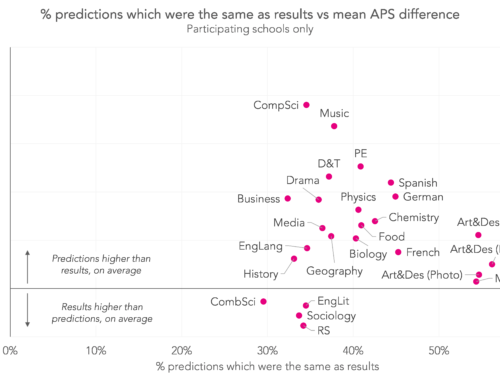

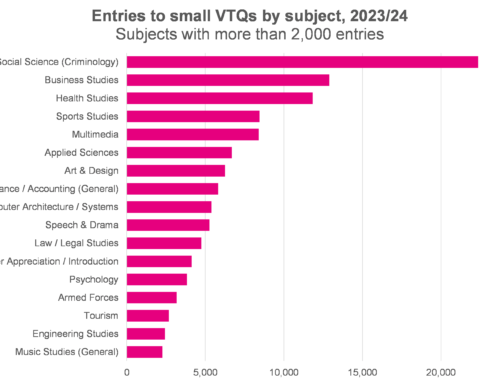
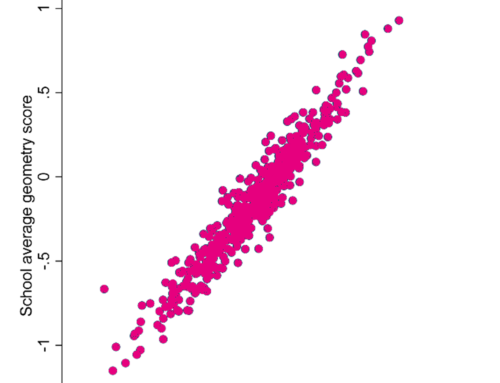
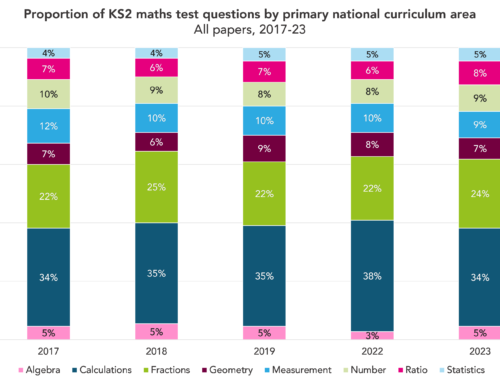
Leave A Comment